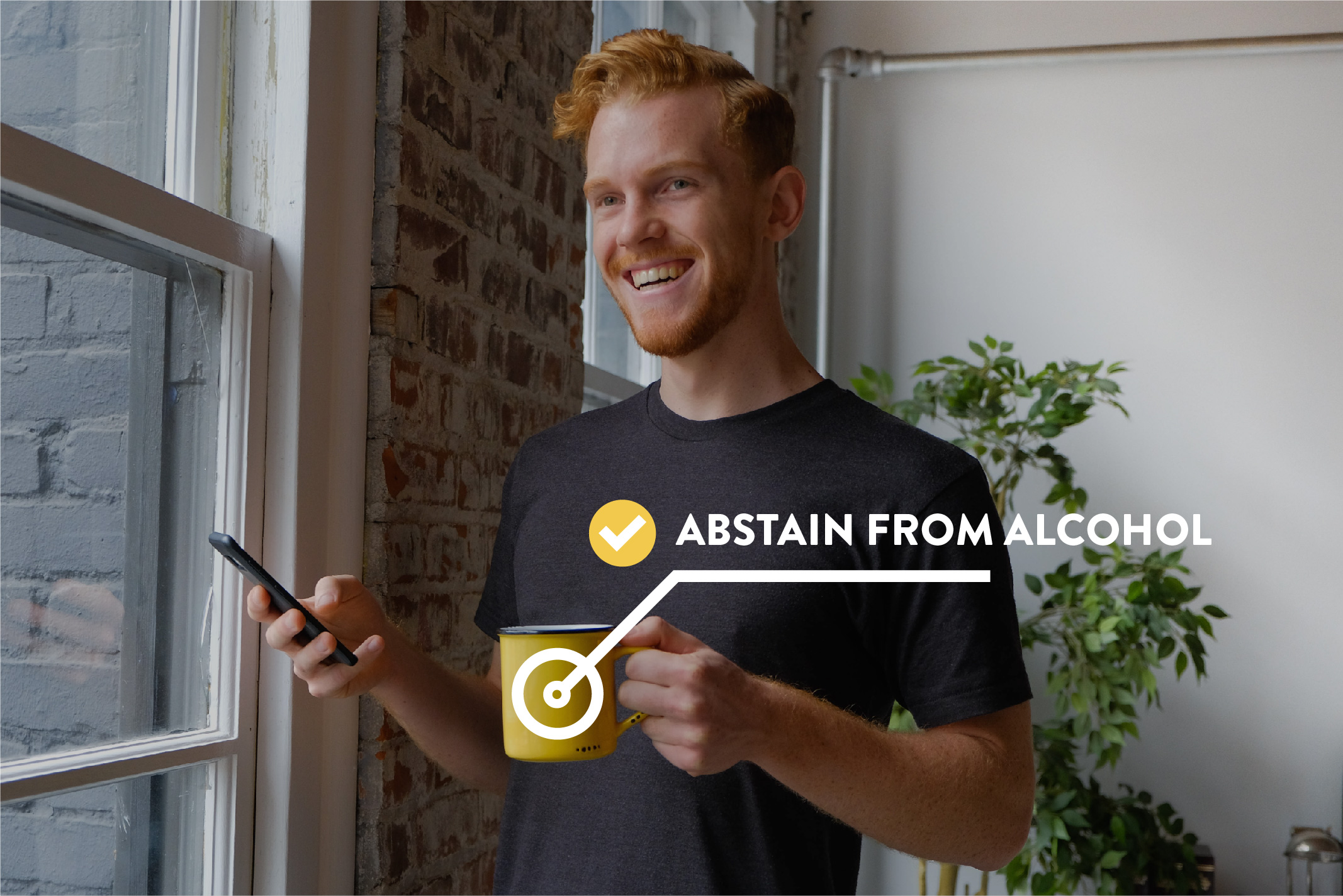Alcoholic drinks are intertwined with many of our adult social activities—birthday celebrations, toasts at weddings, getting together for drinks with friends, and lunch meetings with business clients. To some, it may seem inevitable that you’ll be having a boozy drink here and there. But it doesn’t have to be that way!
A lot of people may self-assess as social drinkers, occasional drinkers, or feel they drink in relative moderation and won’t need to modify their drinking behaviors. But one of the easiest things to do is ask if your clients are reaching their health goals and to track their drinking tendencies in an objective way. Chances are, their drinking could be sabotaging their chances of reaching their goals without them realizing it. Nearly 25% of men meet the criteria as having alcohol dependence [1]. Or potentially be unaware of having an alcohol use disorder [2].
Here are some examples of the health benefits that happen when you ban the booze (both immediately after stopping and effects found within one month):
- Longer and deeper sleeps [3] [4] [5] [6]
- Better mood (less anxious and/or depressed) [3] [4]
- Improved cognition (memory, problem solving, focus, critical thinking) [3] [4] [5] [6]
- Decreased risk of getting certain cancers, liver disease, pancreatitis, or some heart conditions [4] [6]
- Reduced risk ofWernicke-Korsakoff syndrome (lack of vitamin B1) [6] [7]
- Lower blood sugar levels by 16% [5]
- Lower cholesterol levels by 5% [5]
- Weight loss (especially for women) [5] [6]
Certainly, a lot of your personal training clients will take note of the last point.
The unlikely health benefits of moderate drinking habits
Good work, you evidence-based trainer! Yes indeed, science has found that moderate consumers of alcohol, particularly those in middle and later ages, stand to gain protection against cardiovascular diseases [8] [9], like coronary heart disease [1] [10], and at least one study suggests that some people even slightly increase their intake [10].
So why abstain?
The short and long-term benefits to reducing alcohol intake for the majority of the population, even for a month, outweighs the potential benefits for many individuals as found by a study following the Dry January program in the UK [11].
Aside from the direct health benefits mentioned above, many participants in the study also saved money, felt more in control of their drinking, and thought more about their drinking patterns. Most strikingly, six months later they drank less on average (less frequent and in fewer amounts) than prior to the dry month. So it appears even going sober for 30 days can have long-lasting health behavioral effects whether you’re a moderate drinker.
Abstaining from alcohol—the habit you do, by not doing
It seems maybe a little perplexing to think of creating a habit of not doing something. How do you track not doing something? There are two approaches to this, and it’s up to the coach to determine what would be best for any particular client.
The first approach is a little more straightforward and aimed at the client who drinks in light-to-moderate amounts. For this you will just track by answering the question, ”Did I abstain from alcohol today?” If roadblocks arise, you can coach and support your client afterward.
Trying a 30-day challenge with long-lasting health effects is perfect for the beginner client. Trainerize’s habit tracking feature and scheduling calendar make administering a 30-day challenge fun and rewarding.
Dropping heavy drinking habits
In your work, you may encounter some more complex cases where a client has fairly heavy drinking habits and the need to change that is much more obvious. We can describe these as more “complex” because for these clients—classified as heavy drinkers—there might be a lot more at play than the simple or casual decision between soda or beer.
Heavy drinking is defined as more than four drinks a day or a total of more than 14 drinks a week for men. For women, three drinks a day or seven a week [12]. These clients might deny drinking is an issue for them, and will likely have drinking ingrained as part of their daily behaviors. To start tackling this, you will need your client to identify all the cues (internal and external) that lead them to drink. Once this is done, you can figure out the appropriate replacement behaviors to slot into the habit loop.
For example, the client identifies when they get home from work they like to have a few drinks to unwind. They are able to identify that they are still feeling stressed from work when they get home. The external cue is getting home from work, the internal cue is feeling stressed. Use both cues in the habit intention statement. Although not as simple as identifying a single cue, this tactic can be a useful catch-all.
“When I get home from work and I am feeling stressed (cues), I will get a carbonated water from the fridge because there won’t be beer in the fridge, and do 15 mins of meditative yoga (new replacement behaviors). This will help me unwind (reward).”
Teamwork makes the dream work
Abstaining for a month is also a great group challenge to do. Having a fixed timeframe to complete a habit is helpful for many. Plus, the benefits last after the challenge is over. Trainerize has a great group feature that allows you to build and provide group challenges. This allows your clients to support each other, and feed off one another’s success and experiences.
Abstaining from alcohol in a nutshell:
- Abstaining from alcohol can have immediate and long term benefits.
- Banning booze from your diet improves everything from sleep, mood, to overall cognitive capacity.
- Physical health benefits range from a healthier liver, pancreas, and heart, to weight loss.
- Trainerize has features that allow for a 30-day challenge habit, both as individuals and as a group.
References:
- Standridge, John B., et al. “Alcohol consumption: an overview of benefits and risks.” Southern Medical Journal, July 2004, p. 664+. Gale Academic OneFile, Accessed 18 Sept. 2019
- https://www.niaaa.nih.gov/alcohol-health/overview-alcohol-consumption/alcohol-use-disorders
- https://www.drugrehab.com/addiction/alcohol/benefits-of-sobriety/
- https://www.niaaa.nih.gov/alcohols-effects-body
- https://www.newscientist.com/article/mg22129502.600-our-liver-vacation-is-a-dry-january-really-worth-it/
- https://www.livestrong.com/article/1012103-benefits-quitting-alcohol/
- https://www.livestrong.com/article/1012103-benefits-quitting-alcohol/
- Kathleen A. Meister, Elizabeth M. Whelan & Ruth Kava. (2008). The Health Effects of Moderate Alcohol Intake in Humans: An Epidemiologic Review. Critical Reviews in Clinical Laboratory Sciences Volume 37, 2000 – Issue 3; 261-296
- Eric Rimm. (2000). Alcohol and cardiovascular disease. Current Atherosclerosis Reports, Volume 2, Number 6, Page 529.
- JONATHAN CHICK, ALCOHOL, HEALTH, AND THE HEART: IMPLICATIONS FOR CLINICIANS, Alcohol and Alcoholism, Volume 33, Issue 6, November 1998, Pages 576–591, https://doi.org/10.1093/alcalc/33.6.576
- de Visser, Richard O, Robinson, Emily and Bond, Rod (2016) Voluntary temporary abstinence from alcohol during “Dry January” and subsequent alcohol use. Health Psychology, 35 (3). pp. 281-289. ISSN 0278-6133
- https://www.rethinkingdrinking.niaaa.nih.gov/how-much-is-too-much/is-your-drinking-pattern-risky/whats-at-risk-or-heavy-drinking.aspx

